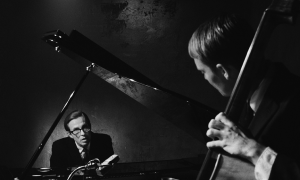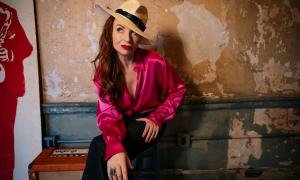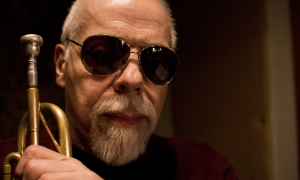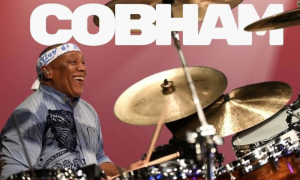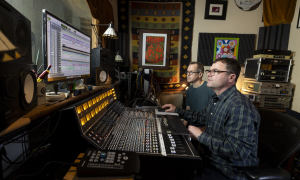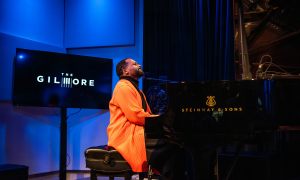Sixty years ago this month, the Gerry Mulligan Quartet was formed. Original members were Mulligan on baritone sax, Chet Baker on trumpet, Bob Whitlock on bass and Chico Hamilton on drums. Much of the credit for the group goes to Bob Whitlock. If not for him, the quartet may never have been—or at least not in its famed formation. [Photo above, from left: Bob Whitlock, Chet Baker and Gerry Mulligan]
Bob is the one who introduced his roommate and trumpeter Chet Baker to Mulligan in 1952, and when Chet quit in a huff after their first meeting, Bob was the one who talked Mulligan into taking him back.
In Part 2 of my five-part interview with Bob, the West Coast bassist talks about bringing Baker together with Mulligan and why the piano became anathema to all four members of the quartet...
JazzWax: How did you wind up gigging steadily with Gerry Mulligan in Los Angles in early 1952?
Bob Whitlock: I got a call one day from a woman who I thought was a manager or agent. She said she had gotten my name from someone and asked if I was interested in coming to a rehearsal with Gerry Mulligan.
JW: What did you think?
BW: I was delighted. I couldn't believe my luck. So I jumped on the opportunity in a hot minute. Gerry had somehow got hooked up at a place where he could rehearse in the San Fernando Valley—a little Italian restaurant with sawdust on the floor.
JW: Did you already know Mulligan personally?
BW: No, I had never played with him or met him. But I knew his music and records. When I came in and set up, the first thing Gerry said to me was, “Let's play some blues." That was a relief. But then he said, “Go ahead and kick it off, give me four bars." I flipped, but I took off and played a four-bar intro.
JW: How did you do?
BW: I kind of surprised myself that the line came out as good as it did. I was kind of scared. Hell, it was Gerry Mulligan. This guy had been on the Miles Davis Nonet recordings [above, later known as The Birth of the Cool], the best jazz sides in some time. I was scared and inspired.
JW: Were you responsible for introducing Chet Baker to Gerry Mulligan?
BW: Yes. After I started playing with Gerry regularly, we had a record date on Vine. We had been playing with these two guys who Gerry had picked up in Albuquerque, N.M., when he hitchhiked across the country with his girlfriend [Gail Madden]. They had put up Gerry and Gail, so Gerry and Gail had asked them to come to L.A. One guy played drums and sax and the other played trumpet. But they weren't cutting it. We recorded all evening on Vine and there was nothing we could use at the end of the night.
JW: How did you know Baker?
BW: I had been rooming with him for a couple of years. When I mentioned to Gerry at the session that Chet would be perfect for us, Gerry told me to bring him by. Back at our place, I told Chet. He was delighted and beside himself. He and I used to just sit and listen to the Miles Davis Nonet stuff. Chet couldn't get over it.
JW: What was the next step?
BW: Chet and I went to a rehearsal Gerry held. But Chet had this really disturbing habit. When he'd warm up, he'd do it quickly and loud. He'd blast out these pedal tones and high notes. It was like he was putting his lip through a challenge. It wasn't easy to listen to.
JW: What was Mulligan's reaction?
BW: Gerry went off on him. He said, “Don't ever do that around me." Chet was insulted, naturally, and he was an independent little dude [laughs]. Chet said, “Go fuck yourself" and packed up his horn and walked out. Right after that, Bird [Charlie Parker] came out to L.A., and Chet went to work with him at the Tiffany Club on 8th near Normandy. Bird took to Chet right away. Soon they got booked in San Francisco, and Chet played around with him for a couple of months.
JW: What was the result?
BW: Playing with Bird did Chet's reputation a world of good. Bird kept raving about him. Soon, Gerry felt like a jerk about what he had done, especially after he had heard what Chet was capable of playing on the instrument. In all fairness, there was no way for Gerry to know about Chet's abilities at a rehearsal where Chet was blasting his horn and exercising his lip.
JW: How did Mulligan and Baker get back together?
BW: After Chet split and was playing with Bird, I would say some delicate lightweight, apologizing things to Gerry, noting that the rift was just a misunderstanding. I said, “That's just the way Chet warms up." Gerry asked me to have Chet come to the next rehearsal.
JW: What happened?
BW: When Chet showed up, two minutes in it was obvious that we had a fantastic combination. We were building things, and they played like one mind working two horns. Funny enough Chet continued to do that warm-up thing and Gerry ate it [laughs].
JW: Who was Phil Turetsky?
BW: Phil was a recording engineer who was connected to Dick Bock, who handled publicity at the Haig. Phil had a little studio at his house up in Laurel Canyon, northwest of Los Angeles. He would record whoever had some promise. In 1952, Dick Bock approached him about doing some recording for a label he wanted to start called Pacific Jazz. [Photo, clockwise from top: Phil Turetsky, Bud Shank and Laurido Almeida]
JW: Do you remember recording there with Gerry Mulligan, Chet Baker and Chico Hamilton in August 1952?
BW: Yes. I had been working at the Haig on the off-nights for two or three months before the quartet was formed. I wasn't the only one. There were other bass players and drummers in the group. Gerry was trying different people to see who would fit his concept. After I became a regular, he chose Chico.
JW: Everything worked out?
BW: Yes. Gerry liked my playing. The next thing we did was this little recording session at Phil Turetsky's. At the time I formally joined Gerry, I had been working with Art Pepper. Art played at the Haig for a while with his group. Then Gerry and Art started playing together. Gerry was still using the piano. I think Gil Barrios was playing it.
JW: What happened to the piano at the Haig?
BW: The piano was a huge grand. Erroll Garner had been the featured soloist there. The piano was so long that the front extended into the room and had to sit on a crate. It took up a ton of space. So Gerry had it taken out. Gerry never gave me a direct answer as to why he stopped using a piano in the group, but I know he felt the piano was a pain in the ass, musically.
JW: A pain in the ass?
BW: Everyone always had to conform to what the piano was playing and Gerry didn't want to do that. The piano was a naturally dominant instrument because of its rhythm function and multiple notes. The ear had to hear it. I think Gerry was tired of having to follow it. The piano made the music too complicated, and the other musicians weren't free enough to invent lines.
JW: How did Mulligan develop the quartet sound?
BW: On Mondays at the Haig. It was Dick Bock's [pictured] idea to get us taped and produced. I felt very comfortable with that group. I liked the challenge of playing a bass line that really defined the harmony without sounding like you're just running chord changes. The challenge was to keep our lines simple enough to swing.
JW: A challenge?
BW: At first, for me. It's easy to get caught up trying to make your lines too cute. When that happens, the bass loses the reason why it's there. Meeting that challenge was the reason for going to work every night. I felt like I had utter freedom and I never abused that. I was totally exposed as a player. Sometimes that was difficult.
JW: Why?
BW: It would get humid and warm in the Haig, and just trying to keep the four of us in tune with each other was tough. It's not easy to play when you're constantly trying to adjust the bass's tuning pegs at the same time. It's a hell of an experience. But it didn't take very long for the whole thing we were doing to become accepted.
JW: Wasn't the quartet always accepted?
BW: Not really. For a time, people ridiculed it. They came in and thought we should have someone defining the harmony, like a guitar or piano. The tradeoff for us was the experimental freedom. Instead of having to chase the pianist all night, we could intermingle without that stress or interference.
JW: That was a radical concept?
BW: It was at the time. The piano was key in many groups. But you coul often get a pianist who thought he was hotter than everyone else and could ruin everything in a hurry. Without the piano, we could pay attention to each other.
JazzWax tracks: The Pacific Jazz recordings of theGerry Mulligan Quartet can be found on a two-CD set, The Original Quaret with Chet Baker, at Amazon here. Bob Whitlock is on tracks #6 through #14 on disc #1.
JazzWax clip: Here's Gerry Mulligan's Nights at the Turntable. Pay particular attention to Bob Whitlock's bass lines and interactions...
In Part 2 of my five-part interview with Bob, the West Coast bassist talks about bringing Baker together with Mulligan and why the piano became anathema to all four members of the quartet...
JazzWax: How did you wind up gigging steadily with Gerry Mulligan in Los Angles in early 1952?
Bob Whitlock: I got a call one day from a woman who I thought was a manager or agent. She said she had gotten my name from someone and asked if I was interested in coming to a rehearsal with Gerry Mulligan.
BW: I was delighted. I couldn't believe my luck. So I jumped on the opportunity in a hot minute. Gerry had somehow got hooked up at a place where he could rehearse in the San Fernando Valley—a little Italian restaurant with sawdust on the floor.
JW: Did you already know Mulligan personally?
BW: No, I had never played with him or met him. But I knew his music and records. When I came in and set up, the first thing Gerry said to me was, “Let's play some blues." That was a relief. But then he said, “Go ahead and kick it off, give me four bars." I flipped, but I took off and played a four-bar intro.
BW: I kind of surprised myself that the line came out as good as it did. I was kind of scared. Hell, it was Gerry Mulligan. This guy had been on the Miles Davis Nonet recordings [above, later known as The Birth of the Cool], the best jazz sides in some time. I was scared and inspired.
BW: Yes. After I started playing with Gerry regularly, we had a record date on Vine. We had been playing with these two guys who Gerry had picked up in Albuquerque, N.M., when he hitchhiked across the country with his girlfriend [Gail Madden]. They had put up Gerry and Gail, so Gerry and Gail had asked them to come to L.A. One guy played drums and sax and the other played trumpet. But they weren't cutting it. We recorded all evening on Vine and there was nothing we could use at the end of the night.
BW: I had been rooming with him for a couple of years. When I mentioned to Gerry at the session that Chet would be perfect for us, Gerry told me to bring him by. Back at our place, I told Chet. He was delighted and beside himself. He and I used to just sit and listen to the Miles Davis Nonet stuff. Chet couldn't get over it.
JW: What was the next step?
BW: Chet and I went to a rehearsal Gerry held. But Chet had this really disturbing habit. When he'd warm up, he'd do it quickly and loud. He'd blast out these pedal tones and high notes. It was like he was putting his lip through a challenge. It wasn't easy to listen to.
BW: Gerry went off on him. He said, “Don't ever do that around me." Chet was insulted, naturally, and he was an independent little dude [laughs]. Chet said, “Go fuck yourself" and packed up his horn and walked out. Right after that, Bird [Charlie Parker] came out to L.A., and Chet went to work with him at the Tiffany Club on 8th near Normandy. Bird took to Chet right away. Soon they got booked in San Francisco, and Chet played around with him for a couple of months.
BW: Playing with Bird did Chet's reputation a world of good. Bird kept raving about him. Soon, Gerry felt like a jerk about what he had done, especially after he had heard what Chet was capable of playing on the instrument. In all fairness, there was no way for Gerry to know about Chet's abilities at a rehearsal where Chet was blasting his horn and exercising his lip.
JW: How did Mulligan and Baker get back together?
BW: After Chet split and was playing with Bird, I would say some delicate lightweight, apologizing things to Gerry, noting that the rift was just a misunderstanding. I said, “That's just the way Chet warms up." Gerry asked me to have Chet come to the next rehearsal.
BW: When Chet showed up, two minutes in it was obvious that we had a fantastic combination. We were building things, and they played like one mind working two horns. Funny enough Chet continued to do that warm-up thing and Gerry ate it [laughs].
BW: Phil was a recording engineer who was connected to Dick Bock, who handled publicity at the Haig. Phil had a little studio at his house up in Laurel Canyon, northwest of Los Angeles. He would record whoever had some promise. In 1952, Dick Bock approached him about doing some recording for a label he wanted to start called Pacific Jazz. [Photo, clockwise from top: Phil Turetsky, Bud Shank and Laurido Almeida]
BW: Yes. I had been working at the Haig on the off-nights for two or three months before the quartet was formed. I wasn't the only one. There were other bass players and drummers in the group. Gerry was trying different people to see who would fit his concept. After I became a regular, he chose Chico.
JW: Everything worked out?
BW: Yes. Gerry liked my playing. The next thing we did was this little recording session at Phil Turetsky's. At the time I formally joined Gerry, I had been working with Art Pepper. Art played at the Haig for a while with his group. Then Gerry and Art started playing together. Gerry was still using the piano. I think Gil Barrios was playing it.
BW: The piano was a huge grand. Erroll Garner had been the featured soloist there. The piano was so long that the front extended into the room and had to sit on a crate. It took up a ton of space. So Gerry had it taken out. Gerry never gave me a direct answer as to why he stopped using a piano in the group, but I know he felt the piano was a pain in the ass, musically.
BW: Everyone always had to conform to what the piano was playing and Gerry didn't want to do that. The piano was a naturally dominant instrument because of its rhythm function and multiple notes. The ear had to hear it. I think Gerry was tired of having to follow it. The piano made the music too complicated, and the other musicians weren't free enough to invent lines.
BW: On Mondays at the Haig. It was Dick Bock's [pictured] idea to get us taped and produced. I felt very comfortable with that group. I liked the challenge of playing a bass line that really defined the harmony without sounding like you're just running chord changes. The challenge was to keep our lines simple enough to swing.
BW: At first, for me. It's easy to get caught up trying to make your lines too cute. When that happens, the bass loses the reason why it's there. Meeting that challenge was the reason for going to work every night. I felt like I had utter freedom and I never abused that. I was totally exposed as a player. Sometimes that was difficult.
JW: Why?
BW: It would get humid and warm in the Haig, and just trying to keep the four of us in tune with each other was tough. It's not easy to play when you're constantly trying to adjust the bass's tuning pegs at the same time. It's a hell of an experience. But it didn't take very long for the whole thing we were doing to become accepted.
BW: Not really. For a time, people ridiculed it. They came in and thought we should have someone defining the harmony, like a guitar or piano. The tradeoff for us was the experimental freedom. Instead of having to chase the pianist all night, we could intermingle without that stress or interference.
JW: That was a radical concept?
BW: It was at the time. The piano was key in many groups. But you coul often get a pianist who thought he was hotter than everyone else and could ruin everything in a hurry. Without the piano, we could pay attention to each other.
JazzWax tracks: The Pacific Jazz recordings of the
JazzWax clip: Here's Gerry Mulligan's Nights at the Turntable. Pay particular attention to Bob Whitlock's bass lines and interactions...
This story appears courtesy of JazzWax by Marc Myers.
Copyright © 2026. All rights reserved.







